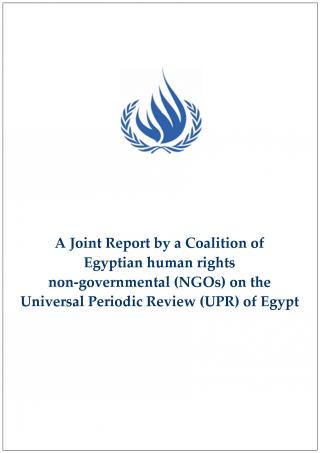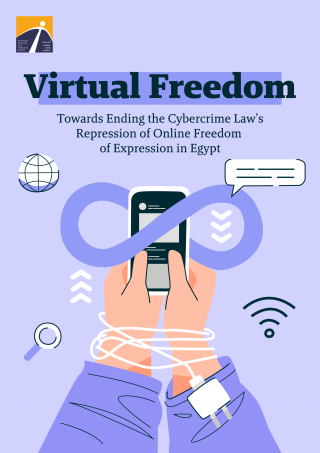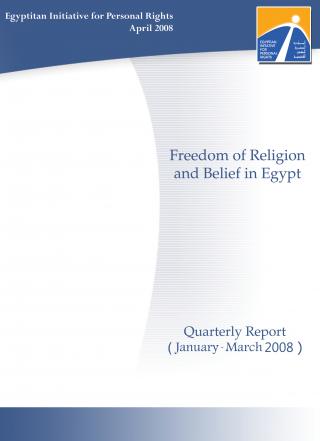The undersigned organizations urge the parliament to look closely at the laws adopted over the past five years that show not even a minimum regard for individual rights and liberties and violate constitutional provisions.
Search
This report offers the collective testimony of the Forum for Independent Human Rights NGOs on the human rights situation in Egypt. Although the report focuses on the last four years, it relies on the products of nearly a quarter century of human rights advocacy and activism, both on the ground and in the legal arena. Since this report cannot document all the pertinent developments and abuses witnessed during the period under review, it will focus on those events and cases that are broadly indicative of the major problems and obstacles preventing Egyptians from exercising rights upheld by international human rights treaties that have been ratified by the Egyptian government.
The incident in Deir Gabal Al Tair village took place after the disappearance of Iman Morqos Sarufim amid allegations from her family that she was kidnapped by a Muslim resident of a nearby village.
This Report- examines the most significant developments in Egypt for freedom of religion and belief during the months of October, November and December 2009.
Dear friends of the Egyptian Initiative for Personal Rights
Egypt’s 2016 Church Construction Law established what was, on its face, a streamlined process for the construction of churches, and also provided for a committee to formalize churches which had been built illegally. But Christians still face both official and social restrictions on building their houses of worship, as officials have been slow to issue permits (even to existing churches seeking recognition), security agencies have failed to protect churches and Coptic properties, and violence from neighbors has succeeded in keeping churches out of contested areas.
This study was prepared by Amr Abdel Rahman, director of EIPR’s Civil Liberties Unit. The desk research and data collection was carried out by EIPR’s researcher Mahmoud Nagy. Lobna Darwish, director of the Women's Rights and Gender Program, provided advice and comments on various drafts of this study. The final review and editing was made by Karim Ennarah, deputy executive director of research at EIPR.
The Coptic Orthodox Church celebrated the Coptic New Year, also known as All Martyrs Day, on September 11. Earlier this year, Coptic Orthodox Pope Tawadros II of Alexandria, accompanied by a number of bishops in a mournful procession at Cairo airport, received the relics of the Coptic martyrs beheaded by the Islamic State three years ago in Libya.
(13 June, 2010)- The United Nations Human Rights Council (UNHRC) concluded its first review of the human rights situation in Egypt under the new Universal Periodic Review (UPR) mechanism.
The Egyptian Initiative for Personal Rights is deeply concerned about the judgment issued yesterday by the Atfih Misdemeanor Court in the Giza governorate in case no.
In an end-of-year statement, EIPR lamented that despite its shortcomings, the new constitution had established important new protections for citizens against oppression and injustice.
2012 Sir Suma Chakrabarti
President, EBRD
One Exchange Square
London EC2A 2JN
United Kingdom
Re: EBRD Country Assessment and Operational Priorities for Egypt
Introduction- This report provides a brief overview of the most significant developments for freedom of religion and belief in Egypt during the first three months of 2008. It documents new court rulings, legislation and government policies relevant to freedom of religion and belief, as well as instances of religious discrimination and other violations of religious freedom. It also reports on incidents of sectarian tension and violence and reviews the most important reports, publications, and activities related to the topic during the reporting period.
(19 February 2010, Geneva) The UN review of Egypt's rights record has been overshadowed by the Egyptian government’s use of its diplomatic relations to limit a constructive debate, preventing real concerns from being raised while denying all human
This report provides a brief overview of a number of significant developments for freedom of religion and belief in Egypt during the months of April, May, and June of 2008. The report reveals an overall escalation of sectarian tensions during the reporting period, which in some cases escalated into the use of collective violence against Copts due to the actions of individual Copts or rumors about such actions, as seen in two separate incidents in the province of Fayyoum in June.
This Report addresses a number of significant developments seen in Egypt in the field of freedom of religion and belief during the months of July, August, and September of 2008. It documents an expansion in the geographical scope of sectarian violence and tensions, reaching from Shubra al-Kheima in Greater Cairo and the district of Atfih in Giza to Naga' Hamadi in Qena, al-Fashn in Beni Soueif, and Samalut and Mallawi in Minya.
The Forum of Independent Human Rights Organizations congratulates the Egyptian people for their successful revolution and the removal of the dictator Hosni Mubarak, who denied dignity and humanity to Egyptians for three decades.
This year, on the occasion of the centennial of the Armenian Genocide, we join in extending our condolences to the global Armenian community for the mass extermination campaign against them in 1915, which is commemorated annually on April 24th.
The recent developments also come as a direct response to our activities in the field of international advocacy, and in particular our meetings with a number of diplomatic missions, the most recent of which was a meeting held at EIPR’s headquarters on November 3rd with 13 ambassadors and accredited diplomats, who discussed ways to improve human rights conditions in Egypt.
The Egyptian government should keep its promise to free detainees who can no longer be held because of changes on May 11, 2010, in the scope of application for the country’s emergency law, a coalition of twelve Egyptian and international human rig











